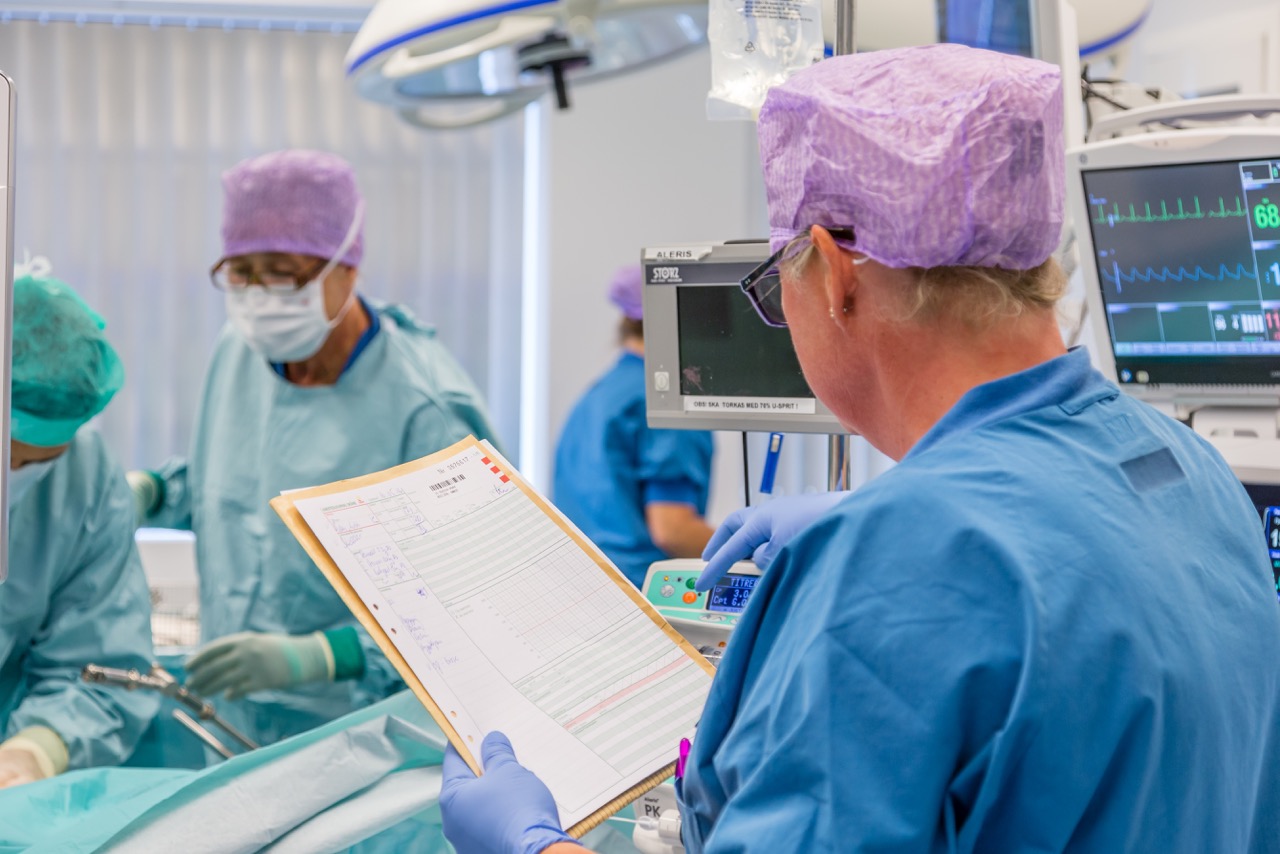
Narkosläkare Magnus berättar om sövningen vid gastric bypass och sleeve
Hur går sövningen till vid en fetmaoperation? Syftet med anestesin vid en fetmaoperation -förutom att göra det möjligt att operera dig -är att bidra till att du ska må så bra som möjligt efter operationen med hänsyn till smärta, illamående, mobilisering och temperaturkontroll.
När du kommer in till operationssalen har du har sannolikt redan fått en perifer venkateter i ena armen på avdelningen. Vi gör en ytterligare kontroll av din identitet och bekräftar vilken typ av operation som är planerad. På salen finns en del personer som alla har en specifik roll under operationen: vi är 2-3 operationssjuksköterskor/-undersköterska, 2 kirurger, 1-2 anestesisjuksköterskor och anestesiläkare.
Du lägger dig på operationsbordet och några från operationslaget arbetar runt om dig, kopplar dig till övervakningsutrustning och börjar förbereda operationen. Det blir inga stick eller annat smärtsamt som görs på operationssalen medan du är vaken. Vi kopplar även våra läkemedelspumpar till venkatetern och börjar snart ge dig liten dos medicin som hjälper dig slappna av innan att du somnar.
Sövning med intravenösa läkemedel vid gastric bypass och sleeve gastrektomi
I pumparna finns 2 olika mediciner, propofol (sövningsmedel) och remifentanil som är en stark smärtstillande medicin besläktad med morfin. Hos vissa patienter upplevs viss sveda vid infusionen i venen som går bort med lokalbedövning. Det är inte farligt och tyder inte på att venkatetern sitter fel. Innan du somnar helt andas du ren syrgas genom en mask. Detta är en säkerhetsåtgärd. Upplever du masken mycket obehaglig kan vi i flesta fall lätta något på masken så den inte sluter för tätt.
Under tiden du sover kommer vi att luta hela bordet på det sättet att vi reser huvudändan. För att säkra oss om att du inte glider under operationen finns en fotplatta som du skall ligga tätt mot med din fotsula och vi sätter även säkerhetsbälte runtom dina ben.
Vanliga frågor och svar om sövningen vid en fetmaoperation samt den postoperativa vården:
Kommer jag att ha ont efter operationen?
De flesta av våra patienter mår rätt bra när dom vaknar efter operationen och vissa frågar till och med om vi inte skall börja operera snart! Vi förflyttar dig i en säng till uppvakningsavdelningen och där övervakas du i 1-2 timmar innan du kan komma till ditt rum. Cirka 15-20 minuter efter operationens slut har största delen av anestesin tappat sin effekt och du kan förvänta dig obehag som liknar duktig träningsvärk i bukväggen, som om du hade gjort alltför många situps dagen innan. Många upplever även smärta i skuldrorna. Detta förklaras av irritation i diafragman och bukhålan efter titthålsoperationen och att dessa organ delar sensorik med skuldrorna – vi har alltså inte gjort något med skuldrorna. Vissa patienter har en upplevelse av sug högt uppe i bukhålans mitt. Ofta är det effektiv smärtlindring att ändra position och resa sig upp för att minska dessa obehag.
Du behöver inte vara orolig för att lida av kraftiga smärtor. Du skall vara så pass bra smärtlindrad att du kan dra djupa andetag, hosta, kunna röra dig i sängen och slappna av. Se även gärna vår informationsvideo om narkosen.
Du kommer att få extra smärtlindring vid behov – men målet med smärtlindringen är att göra dina obehag hanterbara, inte att göra dig smärtfri! Om vi skulle vara för frikostiga med smärtlindrande läkemedel (morfinliknande medel), så skulle det bidraga starkt till ökat illamående, sänka din andningsförmåga och göra dig väldigt slö. Målet är att hjälpa dig att så snart som möjligt kunna röra på dig och stå i benen. Detta för att minska risken för blodproppar och lungkomplikationer samt att tunntarmarna ska komma i gång och arbeta igen.
Vilka smärtlindrande läkemedel kommer jag att få?
Smärtlindringen består av olika delar. Som standard ges paracetamol och anti-inflammatorisk medicin (eterocoxib) i tablettform på vårdavdelningen. Under operationen ger vi dig även oxykodon, clonidin och lokalbedövning i bukväggen där titthålen kommer att vara.
Kommer jag att må illa efter operationen?
Det är individuellt hur benägen man är för att må illa efter operationer. Patienter som lider av rörelsesjuka (åksjuka) och har mått illa vid tidigare sövningar har förhöjd risk för illamående. Gastric sleeve-patienter mår i viss grad mer illa första timmarna efter operationen än andra operationstyper. I alla fall kommer detta att gå över, oftast första timmarna eller framåt kvällen. För att minska risken för illamående ger vi som standard läkemedel i förebyggande syfte förutom att vi undviker alla anestesigaser och söver med hjälp av propofol.
Är jag helt sövd under operationen?
Ja, det är enda sättet att utföra titthålsoperationer på ett säkert sätt.
Kan jag vakna under operationen?
Nej. Vi bevakar dig konstant under operationen och skulle märka om något inte stämde lång tid innan du skulle bli vid medvetande. Medicinerna vi använder har använts i lång tid och vi har utfört tusentals av dessa operationer utan att det har hänt. Vi övervakar bland annat puls, blodtryck, syresättning, kroppsrörelser, storlek på andetag, tryck i luftvägar och dina ögonrörelser.
När vaknar jag från sövningen?
Du vaknar till den graden från sövningen att du kan själv andas och vi kan kommunicera med dig i enkla meningar direkt efter avslutad operation när du fortfarande ligger på operationsbordet. I de flesta fallen minns patienterna inte dessa första minuter efteråt. Du kommer däremot att vara trött de första timmarna efter operationen när du ligger på uppvakningen och de flesta somnar om i kortare perioder där.
Får jag en slang i halsen?
Ja men endast under tiden du sover. Du kommer inte att vara vaken med slang i halsen.
En slang använder vi för att hjälpa dig med andningen och den kallas endotrakeal tub. Den går ner i luftstrupen. En andra slang går ner i matstrupen. I vissa fall kan patienterna efteråt uppleva obehag i halsen, som börjande halsfluss. Det brukar gå över på 1-2 dagar.
När kan jag träffa mina anhöriga?
När du har lämnat uppvakningsavdelningen. Eftersom det finns andra patienter som håller på att vakna i salen har vi inte möjlighet att ta emot anhöriga där. Oftast kan du själv ringa dina anhöriga från uppvakningsavdelningen.



Senaste kommentarerna